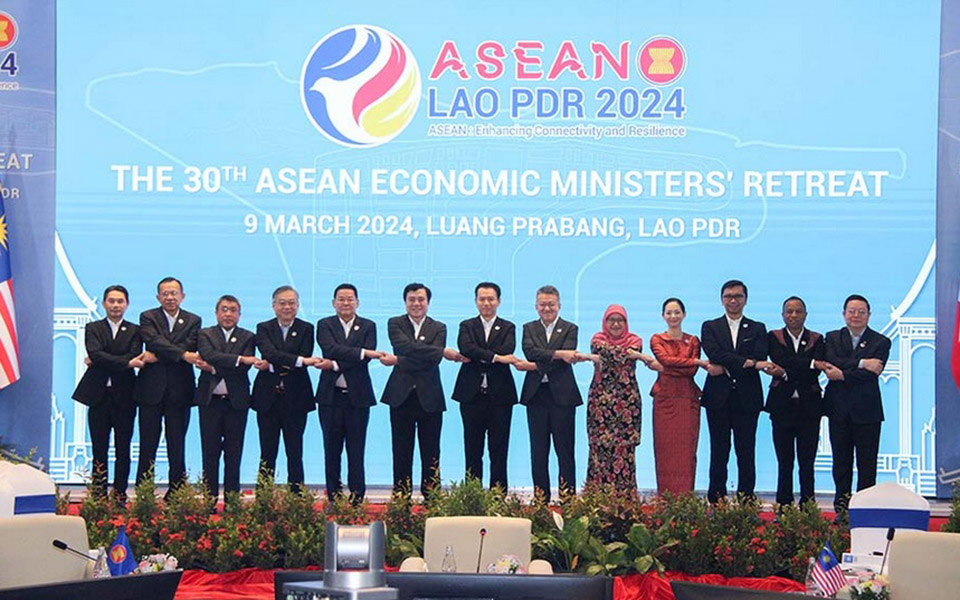
Association of Southeast Asian Nations (ASEAN) economic ministers have concluded talks at their most recent gathering in Luang Prabang, Lao PDR. Thailand’s deputy minister of commerce has shed some light on the results of the 30th ASEAN Economic Ministers (AEM) Retreat, where 6 key topics were advanced. He also revealed that Thai and Myanmar representatives also engaged in bilateral discussions centered on the PM2.5 dust issue.
Deputy Minister of Commerce Napintorn Srisanpang disclosed the results of the Thai delegation’s participation at the 30th AEM Retreat in Laos. He elaborated on the 6 key topics discussed by ASEAN economic ministers with the aim of propelling the regional economy.
The first topic of discussion involved the ministers endorsing crucial economy-related plans that are to be jointly propelled by ASEAN member countries this year. ASEAN members pledged to play a role in global manufacturing, from upstream to downstream, while laying down a foundation for the region’s digital economy and green economy. Important works relating to free trade agreements (FTAs) are being pursued this year, including the conclusion of negotiations on an upgraded ASEAN-China FTA and the coming into effect of the ASEAN-Australia-New Zealand FTA later this year.
For the second topic, economic ministers acknowledged the ASEAN economy’s direction of growth in 2024, when the bloc’s economy is projected to expand by 4.7%. This would exceed the global average growth of 3.1% and would come about mainly due to a recovery in tourism. The ministers agreed that ASEAN needs to take action over 4 matters, namely making adjustments in trade, transportation, and logistics policies; finding new markets and raw material sources; promoting and developing human resources in light of a new economic era; and extracting gains from the green economy and the digital economy.
Regarding the third topic, the economic ministers discussed and gave endorsement to the ASEAN Framework Agreement on Services (AFAS), which is expected to liberalize certain areas of trade and services while also fostering an environment conducive to trade and the service sector.
For the fourth topic, participants at the retreat followed up on the negotiations for upgrading the ASEAN Trade in Goods Agreement (ATIGA). Key matters that remain to be concluded include additional tax reductions, opening up more of the circular market, and the dispute resolution mechanism. For this topic, Thailand has been pushing for lower duties on the remaining 1,266 items, especially items in the agricultural products category such as frozen fresh chicken, rice, and fruit.
The fifth topic involved following up on the upgrading of the ASEAN–China Free Trade Area (ACFTA). The participants at the retreat delivered a policy for the ASEAN bloc to conclude this matter within 2024, noting China’s status as ASEAN’s biggest trading partner for 15 years running and the fact that China is a major e-commerce market that also produces technologies and innovations.
For the sixth topic, the economic ministers followed up on ASEAN’s pursuit of sustainability. Thailand emphasized concrete cooperation among member countries in addressing global warming and the PM2.5 dust situation.
Thailand’s representatives also engaged the participants at the retreat on other matters. As the chair of negotiations pertaining to the ASEAN Digital Economy Framework Agreement (DEFA), Thailand encouraged negotiators to conclude their DEFA talks within two years. Thailand expressed the hope that the DEFA would help promote growth in digital economy products and services and attract more investment from within ASEAN as well as from around the world.
The Thai delegation engaged in talks with Myanmar’s Minister of Investment and Foreign Economic Relations, Dr. Kan Zaw. The two parties especially focused on the PM2.5 airborne dust problem, with Thailand indicating it has been striving to address this problem through the efforts of every sector. The Myanmar authorities have expressed their intention to cooperate with Thailand to address agricultural burning in Myanmar, noting that Myanmar was short on the necessary technologies and also needed to increase the awareness of its farmers while also changing their behavior.
Thai representatives also engaged with Vietnam’s Deputy Minister of Industry and Trade Nguyen Sinh Nhat Tan. The parties discussed the facilitation of shipments of Thailand’s fruit products bound for China, starting in March when the fruit season commences in Thailand. The Vietnamese deputy minister indicated he would be pleased to provide his cooperation on this matter. (NNT)








